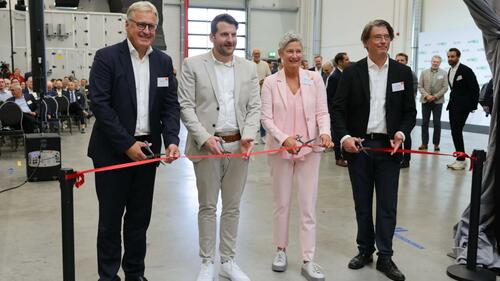E-Lyte opens the first German production plant for electrolyte solutions in Kaiserslautern, Germany
The first German production plant for electrolyte solutions was officially opened at the FUCHS site in Kaiserslautern. With a production volume of up to 20,000 tons of electrolyte per year, E-Lyte Innovations GmbH is setting a significant milestone in the production of high-performance electrolytes for lithium-ion batteries, sodium-ion batteries and supercapacitors. A large part of this production is made directly available to the market for battery electric vehicles.
In May 2022, the FUCHS Group, which operates globally in the lubricants industry, acquired 28% of the shares in E-Lyte Innovations GmbH. With this investment, FUCHS has entered the fast-growing market for electrolytes, which are becoming increasingly important as an essential component of lithium-ion batteries for e-mobility, among other things, especially in Europe. By implementing this project, E-Lyte has established itself as the first German company to be able to offer the European battery market one of the most important components from European production.
Together, the strategic partners have created the necessary production infrastructure in Kaiserslautern to enable E-Lyte to industrialize, scale up and grow further. The production plant is not only one of the most modern of its kind, but also revolutionizes the process of electrolyte production. The highly automated system controls the supply of raw materials precisely and cleanly. Thanks to this efficient system, significantly fewer solvents are required for cleaning, which not only significantly reduces production costs but also the waste produced. This makes the entire process more sustainable and environmentally friendly - one reason why the construction of the plant was funded by the German Environmental Innovation Programme.
“With this cooperation, we wanted to break new ground in the field of new mobility,” says CEO Stefan Fuchs, explaining his company's motives for the strategic partnership. “With E-Lyte, we have expanded our field of expertise and entered the battery market - a new area outside of traditional lubricants. With our expertise in the field of lubricants and functional fluids, we can now cover the entire demand along the life cycle of a battery.”
The FUCHS CEO was particularly impressed by the speed with which E-Lyte has developed from a German start-up to a major European player in the battery market: “We are proud to have supported the development of this state-of-the-art production plant for customized electrolytes as a strong partner with process and production expertise.” It is great that this pioneering role has also been recognized by the nomination for the German Entrepreneur Award. E-Lyte is one of the top 3 finalists in the “Rising Star” category; the award ceremony will take place on September 24, 2024 at the ZDF Capital Studio in Berlin.
Categories
Countries
Latest news
Exolum to Drive Transition Towards Sustainable Fuels at Düsseldorf Airport with €70 Million Investment
The company will build and operate for 20 years a new storage and distribution plant at Düsseldorf Airport, Germany’s fourth largest, connected to the railway network to reduce road transport and C...
Green Light for LyondellBasell Pyrolysis Plant in Wesseling
LyondellBasell's plans for a new pyrolysis plant in Wesseling, Germany, are moving forward after the company received its first partial permit for construction.
Ercros reduces its CO2 emissions by 38% in 4 years
Chemmed Cluster Tarragona →Ercros reduced by 38% its greenhouse gas (GHG) emissions, direct and indirect from energy consumption, and by 9% its total emissions index.These improvements are the result, among others, of the ac...
Lyten to Acquire All Remaining Northvolt Assets in Sweden and Germany
Lyten, the global leader in lithium-sulfur batteries, announced today that it has entered into a binding agreement to acquire Northvolt’s remaining assets in Sweden and Germany.
